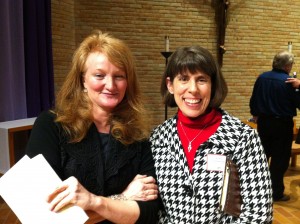 Spiritual genius
Spiritual genius
An evening with Krista Tippett
Human beings are the earth’s most complex and perplexing creatures. The human creature remains a mystery that can’t yet be solved or understood in its many depths. Thus began Krista Tippett in her talk Tuesday evening at Luther Seminary in Saint Paul, Minnesota.
Tippett has become one of National Public Radio’s most interesting show hosts and curator of provocative religious and spiritual conversations. She got her introduction to religion as a child growing up in a Southern Baptist congregation in Oklahoma. Following graduation from Brown University, she took a detour from religious life working and studying abroad as a Fulbright scholar and free-lance journalist. Then she studied at Yale earning an MDiv and worked for a time on an oral history project at the Collegeville Institute at St. John’s University and Abbey.
For ten years Tippett has been the visionary host of On Being (formerly “Speaking of Faith”). On the weekly radio show, syndicated to more than 200 local NPR stations, she interviews those she’s come to identify as possessing spiritual genius. They are theologians, poets, scientists, activists and writers.
She told us about Einstein’s moral equation (something like a mathematical equation, only about human being). He believed that Gandhi, Moses, and Jesus were geniuses in the art of living. His theory of spirituality (something like the theory of relativity, only about the unseen universe) says a sense wonder is at the heart of the best of art, religion, and science.
Tippett unpacked her bags on spiritual genius in three parts.
- spiritual genius is not only about lofty ideals but about embodied and sensate existence. This genius is grounded in time and space and manifest in bodies. She offered Fr. Greg Boyle’s work in Homeboy Ministries as an example. He sees his work with recovering gang members as incarnational, grounded in “a common call to delight in one another,” not merely fixing or helping each other.
- spiritual genius is located solidly in reality with all its difficulties, failures, flaws, and imperfections. In and through these very real and disheartening moments human vitality and wisdom emerge.
- spiritual genius is a matter of practice. As Richard Davidson’s studies of contemplative prayer have demonstrated, the human brain is pliable and changeable, but it takes practice. We do not stop changing and growing when we reach adulthood. Rather over time practice can continue to change us in profound ways.
Virtues, says Tippett, are spiritual technologies for life, practices that can change our way of being in the world. She commended four virtues for our time.
The cultivation of beauty is a core virtue for a spiritual life. John O’Donohue distinguished beauty from glamour. He said, “the defining quality of beauty is that we feel more alive in its presence.”
Asking good questions is also a core virtue for our time. We must love the questions themselves for what they hold, accepting first that we cannot yet fathom their mystery or depths. “Generous questions” Tippett said, “are hard to resist and draw generous answers.”
Keeping a sense of humor is a virtue for our time. It shows up in the honest laughter and delight of every wise person Tippett interviews. She recalled the infectious laughter and sense of humor inDesmond Tutu, Nobel Peace Lauriat and Archbishop Emeritus of Cape Town, South Africa.
Finally, “tenacity for taking in the good” is a virtue for our time. Living in a state of gratitude for all of life can change us, and our world, and even make us happier.
Following her presentation Tippett took questions. Unlike many interviewers who prefer to stay on the asking end of questions, Tippett opened herself to anything the crowd of 250 was ready to ask. She described what she likes to read for pleasure, and how a fairytale expert put her at ease for loving fictional darkness and mayhem.
When asked about spiritual practices, she described years of praying compline and how her disciplines have changed over the years. Yet, she says, each spiritual practice helps her in her quest to let go of controlling outcomes.
When asked about suffering, Tippet replied it is yet another mystery, and not all mysteries are good. Significantly, she said, it is in suffering “where we meet each other.”
Someone asked Tippett who she would most like to interview. She said, “We have no idea who might be doing the thing now that will save the world later.” So she likes interviewing all kinds of people, to participate in the discovery process of the emerging spiritual genius of our time. She also said she would like to interview Fredrick Beuchner. (Let’s hope he says, ‘yes!’)
Another audience member asked given the crumbling situation of churches today, what virtues were most needed for buoying religion through the changes, or what would the emerging structures look like? Tippett named four ancient core values and practices of the church: ritual, story, intergenerational community, and poetry. She sees reconnecting with these practices as powerful and healing for our time and the foreseeable future. We need each one, said Tippett, to survive as human beings.
This post first appeared on the Associated Baptist Press blog.




